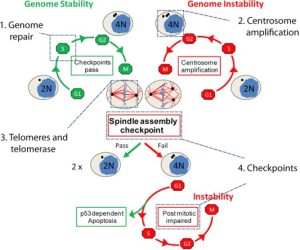Understanding genomic instability
Genomic instability stands as a fundamental hallmark of cancer progression and is often associated with therapy resistance. This instability manifests as an increased frequency of genetic alterations within cancer cells, ranging from single nucleotide variations to large-scale chromosomal rearrangements. These alterations mirror the genomic chaos driving tumor evolution and contribute to the heterogeneity observed within cancer populations.

Unraveling genomic instability signatures
Recent strides in high-throughput sequencing technologies and computational biology have propelled our understanding of genomic instability. Scientists can now identify and characterize genomic instability signatures linked to specific cancer types and treatment responses. These signatures encompass a spectrum of genomic aberrations, including copy number alterations, chromosomal rearrangements, and mutational burdens. By dissecting these signatures, researchers gain invaluable insights into the molecular mechanisms governing tumor heterogeneity and uncover vulnerabilities that can be exploited for therapeutic purposes.
Predictive value in therapeutic response
Perhaps one of the most promising applications of genomic instability signatures lies in their predictive value for therapeutic response. Through comprehensive analysis of the genomic landscape of tumors, clinicians can identify signature profiles indicative of sensitivity or resistance to specific treatments. Armed with this knowledge, therapeutic regimens can be customized to individual patients, optimizing efficacy while minimizing adverse effects. This tailored approach represents a significant step towards precision oncology, where treatment decisions are guided by the unique molecular makeup of each patient’s tumor.
Clinical implications and future directions
Numerous studies have underscored the clinical utility of genomic instability signatures in predicting response to various cancer therapies, including conventional chemotherapy, targeted therapies, and immunotherapy. However, challenges persist in standardizing signature definitions, integrating multi-omics data, and validating predictive models across diverse patient cohorts. Despite these hurdles, the potential of genomic instability signatures to refine cancer treatment strategies and enhance patient outcomes in the era of precision oncology is unmistakable.
_________________________________________________________________________
- Liquid biopsy innovations:Groundbreaking developments in liquid biopsy technology have enabled the detection and monitoring of genomic alterations in circulating tumor DNA (ctDNA). These non-invasive assays offer real-time insights into treatment response and disease progression, revolutionizing cancer diagnostics and monitoring strategies.
_________________________________________________________________________
- Immunotherapy breakthroughs:Exciting discoveries have shed light on the role of genomic biomarkers in predicting response to immune checkpoint inhibitors. This knowledge promises to refine patient selection for immunotherapy-based approaches, maximizing therapeutic benefits while minimizing unnecessary treatment-related toxicity.
_________________________________________________________________________
- AI-Powered drug discovery:Artificial intelligence continues to drive innovation in oncology drug discovery, facilitating the identification of novel therapeutic targets and drug candidates tailored to the molecular profiles of individual tumors. These AI-powered initiatives hold immense potential for accelerating the development of precision oncology therapies.
_________________________________________________________________________
Canary Oncoceutics is marked by a steadfast commitment to three fundamental pillars: advancing scientific knowledge, fostering collaboration, and ultimately, enhancing the lives of cancer patients worldwide. From cutting-edge research to impactful clinical advancements, Canary Oncoceutics aims to illuminate the transformative potential of tailored cancer treatments.
Join us on this journey towards a future where every cancer patient receives personalized, effective treatment tailored to their unique needs.